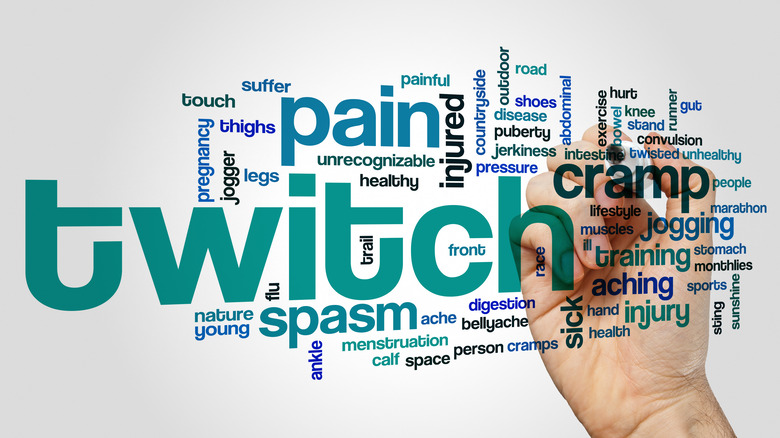Reasons Why Your Leg Won't Stop Twitching
Show of hands, has your leg ever done its own thing and started twitching randomly? While you may notice these twitches, it typically isn't an alarm for concern, points out Healthline. Rather it's a signal that got mixed up somewhere in the brain, nerves, or muscles, shares Medical News Today. When this happens, it leads to involuntary muscle movement — aka your muscle starts twitching. Although it's tempting to say your leg won't stop twitching because it has a mind of its own, there are actually some common causes that trigger a twitch.
Some of the biggest culprits for bouts of leg twitching are stress, anxiety, lack of certain nutrients, and lack of sleep (per Healthline). Withdrawal from or too much alcohol and caffeine can also set off twitches. In other cases, hormonal imbalances, low blood sugar levels, and certain medications may be to blame, explains Medical News Today.
Believe it or not, dehydration and electrolyte imbalances may also cause your muscles to randomly contract or pulse, shares WebMD. And it has been reported by the lay press that approximately 75% of Americans have chronic dehydration (per StatPearls). That being said, dehydration (whether from working out, being sick, or other causes) makes your muscles more susceptible to twitching and cramping (per Healthline). But these aren't the only reasons why your leg won't stop twitching. Sometimes the causes are more serious in nature.
More serious reasons for leg twitching
While bouts of leg twitching may be bothersome, it's highly likely that it's because of lifestyle habits and less serious causes, points out Medical News Today. But in rare instances when the leg muscles spasm and twitch, it can be a sign of something more serious. Recurrent twitching can be a subtle hint that there's an underlying problem with your central nervous system (per Healthline). And this impacts the spinal cord and brain. The twitching then may be a byproduct of nerve and muscle damage, explains Healthline. In these rare cases, these disorders may be the cause: epilepsy, Huntington's disease, Alzheimer's disease, and Lewy body dementia, shares Medical News Today. Amyotrophic lateral sclerosis (ALS) and Hoffmann syndrome may also affect the leg muscles, points out Healthline.
Oftentimes muscle twitching isn't an emergency and subsides on its own. But, if the leg problem becomes recurring, talk with your physician. Treatment for serious conditions may require some medication (e.g. muscle relaxants, neuromuscular blockers, etc.) to help with the twitching, explains Healthline.
However, there are some at-home remedies that may come in handy for preventing a leg that won't stop twitching. The Ohio State University Wexner Medical Center suggests eating a balanced diet, getting quality sleep, staying hydrated, exercising daily, and avoiding highly caffeinated beverages like energy drinks to help stop the muscles from twitching. Focusing on these lifestyle habits may help promote healthy nerves and muscles.


